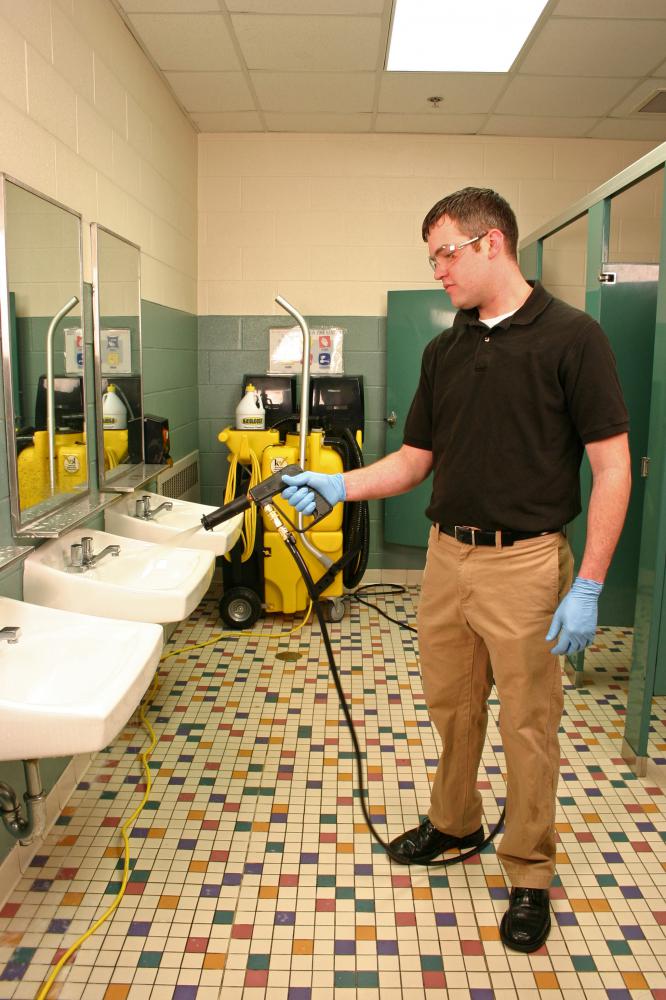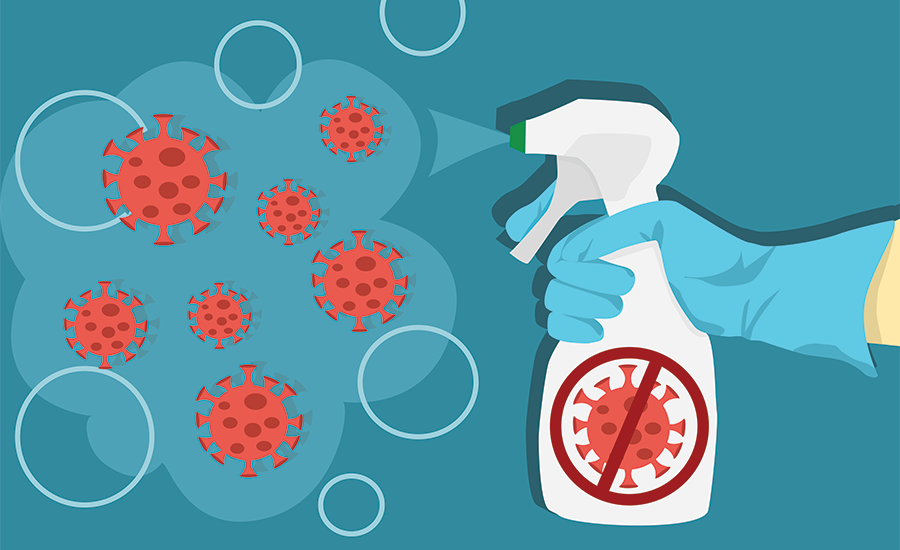Several developments meant to protect the health of casino customers are now in place—many of these pertain to how these properties are cleaned
Casinos in the U.S. and around the world have been hit hard by the COVID-19 pandemic. Most have been closed since early March when the seriousness of the disease became clear. While online gambling is up, global brick-and-mortar gross gaming revenue (GGR) has been cut in half compared to a year ago. The unemployment rate in Las Vegas, the center of the gambling world, is now 25 percent.
However, now, after two months, casinos around the world are getting ready to reopen, but with modifications.
June 4 was the big day for Caesars Palace and the Flamingo in Las Vegas. While both now offer dining, lodging, outdoor pools and socially-distanced gaming options to guests, what they did not initially have open are nightclubs. In the good old days (i.e., pre-COVID), these clubs were designed to fit as many people in as tightly as possible. That’s too dangerous now.
Other safety measures have also been put in place: there are no buffets, valet parking is suspended, and only four people are allowed into the elevators at one time. Further, expect to wear masks and find hand sanitizer throughout the casino floor.
Most other casinos will have similar opening programs in place, and some will open even more gradually. For instance, the Bellagio plans to open with only 1,200 of its 5,000 rooms. Gradual reopenings are designed to test the new protocols, allowing casino owners and managers the time to make changes and address COVID-related challenges they may not have anticipated.
All these steps are intended to protect the health of patrons, and by so doing, keep casinos open. However, behind the scenes, several developments—also meant to protect health—are going on that casino patrons may not be aware of. Many of these pertain to how these properties are cleaned.
DASHBOARDS TECHNOLOGY
For the most part, when it comes to cleaning, casinos will not have the luxury of a gradual rollout. They must have effective cleaning strategies and programs in place from the start. They must know what equipment, methods, products, cleaning solutions, disinfectants, and sanitizers should be in use—and how to use them properly—from the get-go. They also need to know which items they may need to reconsider, or at the very least, learn more about.
To accomplish this, Michael Wilson, vice president of marketing and packaging for AFFLINK, a distributor-member sales and marketing organization, recommends property owners “work with an astute [janitorial] distributor. They are like cleaning encyclopedias. They know which products and cleaning technologies to use where and what will work best in your casino.”
One reason Wilson refers to these distributors as “cleaning encyclopedias” is that some have access to online computer dashboards. These can help the distributor make recommendations to casino owners and managers. “These systems allow owners, managers, and the distributor to work together, see what products are available, the features and benefits of each, as well as cost issues,” he said. “This eliminates ‘trial-and-error’ purchasing, which we cannot have in the post-COVID era.”
BRINGING CLEANING OUT INTO THE OPEN
As more casinos open, cleaning technology won’t be the only thing that’s new, especially regarding restrooms. Frequency and visibility of cleaning are also about to take off.
Because of their guests’ natural fears of contamination, casino owners and managers will want their patrons to see with their own eyes that restrooms are being cleaned. Previously, casino restrooms would be lightly cleaned throughout the day, with major cleaning performed when the facility was less busy.
Now, having them detail cleaned—for everyone to see—will help reduce guest anxiety and concerns about using the restrooms. Further, it will demonstrate firsthand the steps the casino is taking to protect the health of its patrons. This process will be repeated throughout the day, possibly every two hours.

Some restaurants, which share casinos’ goals of making guests feel safe using their restrooms, have hired “bathroom monitors,” whose sole job is to clean restrooms after every use. That will not be possible in a busy casino. But taking casino restrooms offline for up to an hour just to clean them with traditional cleaning techniques—sprayers, cloths, mops, and buckets—is also not an option.
That’s why many casinos in the U.S. and Europe are now using spray-and-vac cleaning systems, according to Marc Ferguson, vice president of global sales for Kaivac. Spray-and-vac cleaning systems apply a cleaning solution to all surfaces to be cleaned. The machine then rinses these surfaces. Some systems also vacuum up moisture, soil, and pathogens, thoroughly removing them from the restroom.
“The International Sanitary Supply Association [ISSA] says these systems clean restrooms in one-third to one-half the time of conventional spray-and-wipe cleaning methods,” Ferguson said. “This means restrooms can be put back into service much faster.”
Further, at least one of these systems has been tested several times over the past 20 years and proven to remove pathogens from surfaces, even without cleaning solution. However, it is recommended to use a disinfectant with these systems. A disinfectant that kills the pathogen that causes COVID-19 has also been approved by the EPA for at least one of these systems.
WHAT ABOUT ELECTRONIC SPRAYERS
Earlier we mentioned some cleaning technologies may require a closer look before selecting them. One such technology is the electrostatic sprayer.
Made by different manufacturers, these machines spray or mist surfaces with disinfectants that kill pathogens. They do this by releasing a positively charged disinfectant that adhere to surfaces, including floors, counters, walls and doors.
Although first invented in the 1930s, the sprayers have become popular recently due to COVID and can prove effective. However, there are some things we need to know about them before adopting them.
First, electrostatic sprayers require longer dwell time than other cleaning methods. In most cases, a disinfectant must set on a surface and remain wet on that surface for about five minutes before it can be wiped clean and the surface used. An electrostatic sprayer may need 10 to 15 minutes before a surface can be used. Further, if the disinfectant mist should dry during dwell time, it should be reapplied to ensure its efficacy.
Second, cleaning best practices tell us that surfaces should always be cleaned first, to remove soils, and then disinfected, to kill pathogens. This two-step process is required to ensure surfaces are germ-free, but it is not always adhered to when using an electrostatic sprayer.
And third, the U.S. Environmental Protection Agency (EPA) is questioning the use of electrostatic sprayers because they do not follow the application protocols established by the manufacturer when the EPA tested the disinfectant. For example, let’s say the manufacturer suggests the disinfectant be wiped on a surface and then wiped clean after five minutes. These steps are not followed when using a sprayer. Because this is not how the EPA tested the disinfectant, the agency cannot guarantee that the disinfectant will be effective when used with a sprayer.
To ensure these systems are best for your casino, or should be used at all, follow Wilson’s earlier recommendation and work with a distributor familiar with them. These are costly machines and not all work alike. Some due diligence will certainly pay off.
APPOINTING A HYGIENE MANAGER
All hotel casinos have housekeeping managers. In fact, many have several, each assigned to different areas of the facility. But in a post-COVID world we need a different kind of cleaning manager and that is a hygiene manager.
Whereas the housekeeping manager is focused on ensuring all necessary cleaning is performed and performed properly, the job of the hygiene manager is to develop a cleaning program that ensures steps are being taken to prevent infection, cross contamination, and the spread of disease.
This may include such things as:
- Selecting infection-prevention cleaning solutions, disinfectants, and other products;
- Determining how frequently certain areas of the facility should be cleaned and disinfected;
- Ensuring housekeepers are trained on infection control strategies;
- Conducting infection prevention inspections; and
- Ensuring all cleaning in the property follows government rules and regulations.
Appointing a hygiene manager also designates one person as the point of contact for any health-related questions, inspections, and decisions in the casino when it comes to infection prevention.
Post-COVID, safety and accountability are on everyone’s mind. Casinos are taking steps now to make sure their facilities can better address a situation like this should it ever reoccur. With these and other steps in place, casinos are sure to be cleaner, healthier, and safer than ever before.
